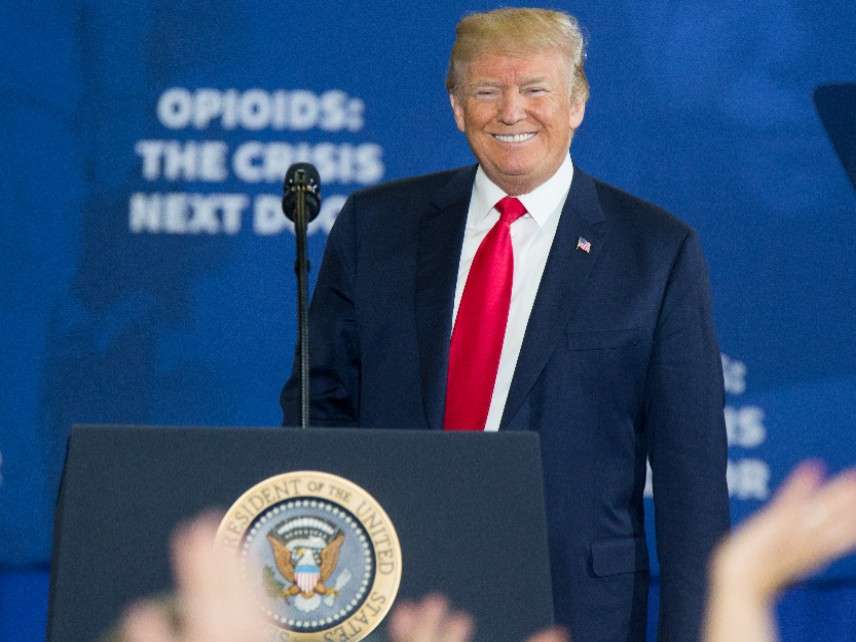Trump Doubles Down on Death for Drug Offenses
Despite potential legal obstacles

In New Hampshire today, President Donald Trump promised once again to tackle the opioid crisis with the full force of the federal government, reiterating his support for executing drug traffickers.
"We have to get tough on those people. We can have all the blue ribbon committees we want, but if we don't get tough on the drug dealers, we're wasting our time. And that toughness includes the death penalty," he said.
Trump's preference for executing drug offenders was first reported last month.
Some drug dealers "will kill thousands of people in their lifetimes," Trump claimed at his New Hampshire event. "They'll be jailed for 30 days, or a year, or they'll be fined. And yet if you kill one person, you get the death penalty or you go to jail for life. If we're not going to get tough on drug dealers who kill thousands of people and destroy so many people's lives, we are just doing the wrong thing."
"This is about winning a very, very tough problem," he added. "Toughness is the thing they most fear."
"Drug trafficking is not an offense for which someone can receive the death penalty," the ACLU's Jesselyn McCurdy said in a statement released shortly after Trump's speech. "The Supreme Court has repeatedly and consistently rejected the use of the death penalty in cases where there has been no murder by the convicted individual."
"Like unnecessarily long prison sentences, there is no evidence that the death penalty actually prevents crime. It's an ineffective way to address this problem," said Ames Grawert, senior counsel in the Justice Program at the NYU School of Law's Brennan Center.
Senators Lindsey Graham (R-S.C.) said Friday that he is working with Sen. Tom Cotton (R-Ark.) on a bill to create new mandatory minimums for fentanyl, and possibly to write a new capital offense into federal drug law.
"I'll also be working with Senator Cotton and others to explore the possibility of even stronger penalties—that could include the death penalty if the fentanyl results in someone's death—for those who choose to push this deadly drug into our communities," Graham said in a press release.
Trump said he would call for more federal funding for developing nonaddictive painkillers, an idea in which FDA Commissioner Scott Gottlieb has also expressed interest. Trump also alluded to changes in the reimbursement practices of Medicaid and Medicare to make sure "opioid addiction is not subsidized by the American taxpayer."
Congressional Republicans claimed in January that Medicaid expansion fueled the epidemic; Stanford's Keith Humphreys has argued otherwise.
"The best way to beat the drug crisis is to keep people from getting hooked on drugs to begin with," Trump said. To that, he supports "spending a lot of money on great commercials showing how bad it is, so that kid's seeing those commercials during the right shows on television of wherever--the internet--when they see these commercials, they say, 'I don't want any part of it.'"
In 2006, the Government Accountability Office published a study on federally funded anti-drug advertising that suggested "exposure to the advertisements generally did not lead youth to disapprove of using drugs and may have promoted perceptions among exposed youth that others' drug use was normal."
"Failure is not an option, addiction is not our future," Trump said. "We will liberate our country from this crisis. We will raise a drug-free generation of children."
"We will be spending the most money ever on the opioid crisis."
Trump touted a new high watermark for National Prescription Drug Take-Back Day, an annual pseudo-holiday in which the Drug Enforcement Administration asks Americans to empty their medicine cabinets of unused and expired drugs. The most recent event, Trump said, saw the agency collect 900,000 pounds of pharmaceutical products, "more than the weight of three Boeing 757s."
The administration often illustrates the impact of the opioid crisis using aeronautical metaphors. "Every three weeks, we are losing as many American lives to drug overdoses as we lost in the 9/11 attacks," Attorney General Jeff Sessions said in 2017.
Trump revealed that "our Customs and Border Protection[sic]" seized three times the amount of illicit fentanyl in 2017 than they did in 2016. "I told China, 'Don't send it,'" Trump declared. "And I told Mexico, 'Don't send it.'"
The Chinese government has denied responsibility for illicit fentanyl use in the U.S., but has nevertheless taken steps to crack down on grey and black market chemical manufacturers. In December, residents of Guangdong province gathered in a sports stadium to watch as seven drug dealers were sentenced to execution.


Show Comments (104)